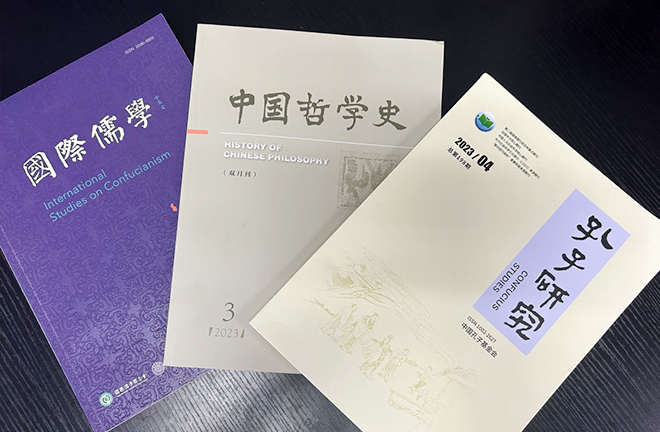Seminar probes knowledge system of Chinese philosophy

Journals of traditional Chinese philosophy Photo: Yang Lanlan/CSST
JI’NAN—A seminar on the disciplinary construction of Yijing (also known as Zhouyi, Book of Changes) studies and Chinese philosophy was held in late July in Ji’nan, Shandong Province. Attendees discussed how to build an independent knowledge system of Chinese philosophy based on indigenous academic resources.
Establishment of subjectivity
Contemporary Chinese philosophers are tasked with exploring advisable ways of creatively absorbing philosophical discourse resources from traditional Chinese philosophy, Marxist philosophy, and Western philosophy. According to Li Chenggui, a professor from the Department of Philosophy and Religious Studies at Nanjing University, we should start by identifying the convergence points of the three based on the traits of Chinese indigenous philosophical discourses in the new era. This requires establishing the subjectivity of the core values of Chinese philosophy in the process of assimilating the discourse of Western philosophy. These efforts serve to achieve self-optimization through integration and interaction with Marxist and Western philosophical discourses.
Li Shangxin, a professor from the Center for Zhouyi and Ancient Chinese Philosophy at Shandong University (SDU), believes that to further exchanges and integration between Chinese and Western philosophy, scholars are encouraged to conduct “interpretation of Chinese philosophy through Western discourses” and vice versa on the basis of self-interpretation of the two sides.
Huang Yushun, a professor from the Advanced Institute for Confucian Studies at SDU, proposed that whichever form it takes, philosophy should include both objective and non-objective discourse. The latter represents fundamental “original discourses” and pre-subjective discourses.
In order to build the discourse of Chinese philosophy amid globalization, Tan Mingran, a professor from the College of Philosophy at Nankai University (NKU), highlighted the necessity of recognizing the heterogeneity between Chinese and Western cultures, upholding the subjectivity of Chinese philosophy, and avoiding evaluating or reconstructing Chinese philosophy by Western standards.
“In the era of globalization, Chinese philosophy is able to provide a new way of thinking over the issue of unitary or plural human civilizations,” said Liu Liangjian, a research fellow from the Institute of Modern Chinese Thought and Culture at East China Normal University. The proposal of Chinese modernization marks an upgrading of the self-understanding of Chinese civilization. The Chinese nation is more consciously aware of its historical mission of creating a new form of human advancement and of breaking through the limitations of thinking imposed by the Western model of modernization.
Features of Chinese philosophy
The dialogue of ideas is the motive mechanism driving academic development. Over the past several millennia, Chinese philosophy has been accompanied by the ideological confrontation of different schools and doctrines in different historical periods. The progress of contemporary Chinese philosophy is also inseparable from the vitality of intellectual dialogue.
In recent years, the discussion on the properties of Chinese philosophy represented by Confucianism has constantly triggered clashes of ideas in philosophical circles. The typical argumentation is over whether Confucianism has transcendence, and if so, how it should be defined. Yang Zebo, a professor from the School of Philosophy at Fudan University, put forward that the development of Confucianism is characterized by two internal threads. The main thread refers to moral practice, while the auxiliary thread refers to moral existence. Moral practice leads people to behave virtuously. Subsequently, individuals adopting such morality will view everything from a perspective of goodness, thus producing the auxiliary thread of moral existence. Once the auxiliary thread of moral existence is formed, the morally colored heavens themselves become the metaphysical basis of morality. This further strengthens the power of moral practice.
Ideology and culture, as carriers of civilization, do not remain unchanged, nor are they accomplished once and for all, but are gradually enriched and integrated in historical succession. Wang Xinchun, a professor from the School of Philosophy and Social Development at SDU, reviewed the interpretation process of the Chinese classic Zhouyi, the construction of the ideological discourse system of previous dynasties, and the formation of the characteristics of Chinese philosophy and culture. Zhouyi originated from divination with the nature of religious witchcraft, and then sublimated into a high philosophical classic centering on heaven and humanity. This process also reveals the rise and fall of irrational belief and philosophical reason in the development of Chinese philosophy, as well as the transformation of the former to the latter.
Logic and argumentation are inherent requirements of philosophy. The question of whether there is logic in traditional Chinese philosophy was once one of the controversies about its nature. Zhai Jincheng, a professor from the College of Philosophy at NKU, pointed out that in light of the relationship between logic and philosophy, a philosophy should incorporate a set of logic as its argumentation tool. Regarding traditional Chinese philosophy, the logic supporting and justifying Chinese philosophical thoughts should also be a unified knowledge system. Zhai explored the construction of Chinese logic knowledge systems by examining the object and content of Chinese logic, the method of analogical reasoning, the reinterpretation of core concepts and issues, as well as general features.
The seminar was co-sponsored by the China Zhouyi Society, the Center for Zhouyi and Ancient Chinese Philosophy at SDU, and the editorial department of Studies of Zhouyi.
Edited by YANG LANLAN
